[ad_1]
With Virgil van Dijk and Mo Salah celebrating birthdays over the summer, Aaron Cutler asks how Arne Slot can get the most out of them well into their 30s.
International tournaments are a grind at the best of times, but Euro 2024 felt like a real slog.
A football ‘festival’ largely devoid of excitement, energy and quality, it appeared one foray too far for a host of teams and footballers clearly out on their feet.
Ollie Watkins’ brilliant last-gasp winner to send England to the final marked a rare high point and looked destined to become the enduring image of the summer.
In fact, had Gareth Southgate’s men gone on to achieve the most unlikely (and arguably undeserved) triumph, that goal would have been as overplayed as ‘Wonderwall‘. Small mercies.
But as the Aston Villa forward wheeled away in celebration, behind him stood a desolate Van Dijk – exhausted, exasperated and beaten.
Future planning
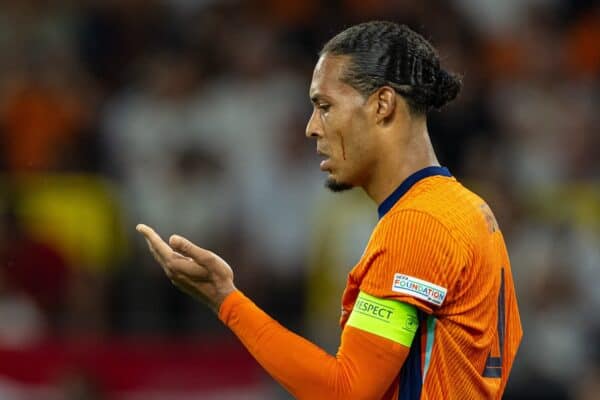

As front-foot in interviews as he is in his defending, the Dutch captain’s post-match comments after that semi-final have sparked a degree of concern amongst Liverpool supporters.
Speaking candidly, he said, “I will think carefully this summer about what I want at club level and as an international player. After a season like this, where all kinds of things have happened, it gets emotional at the end because you know it’s over.”
That quote can interpreted in different ways.
The mischievous amongst us will claim reference to his ‘club’ hints at an uncertain future, underlined by the lack of a contract extension.
In all probability, however, Van Dijk – who turned 33 this month – is considering international retirement.
A late and heartbreaking Euros exit will sting and feel raw for weeks to come. Virgil is experienced enough not to make any rash decisions, but having also described 2023/24 as “a very, very, very long year, a tough year,” he sounds like a man coming to terms with his own footballing mortality.
They won’t say it publicly, but Liverpool will secretly be hoping Sunday marked their captain’s farewell appearance for his national side.
That’s because one of Arne Slot‘s biggest challenges in this, his maiden season, is managing the game time of two totemic figures.
First names on the team sheet


The club have succeeded in bringing the average age of the squad down in the last 18 months. Elder statesmen with tiring legs have departed and arrivals like Darwin Nunez, Cody Gakpo, Alexis Mac Allister, Dominik Szoboszlai and Ryan Gravenberch have brought new energy.
Yet the team remained heavily reliant on Messrs. Van Dijk and Salah last term, certainly up until the point the latter departed for AFCON.
For context, the skipper featured more than any Liverpool player across the entire campaign, bringing up 4,072 minutes in total – 5,395 if you add international minutes.
And only four players saw more action than Salah, who recorded 3,132.
Crucially, both players’ game time was managed to an extent.
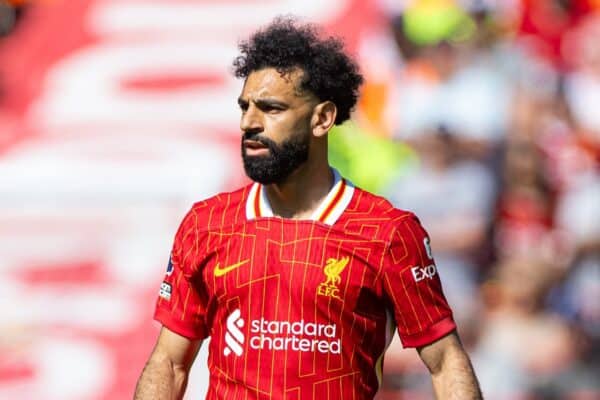

Europa as opposed to Champions League football allowed Jurgen Klopp to rest the pair of them far more than he’d have been prepared to in previous years. Indeed, Van Dijk only played in half of Liverpool’s 10 European ties last term, starting three.
While Salah had run-outs in nine of those, he only started four.
Make no mistake, that respite did wonders for the pair of them, particularly Van Dijk, who rediscovered his best form due to occasional breaks being built into his schedule.
It’s a luxury we won’t have next season.
The benefits of rotation
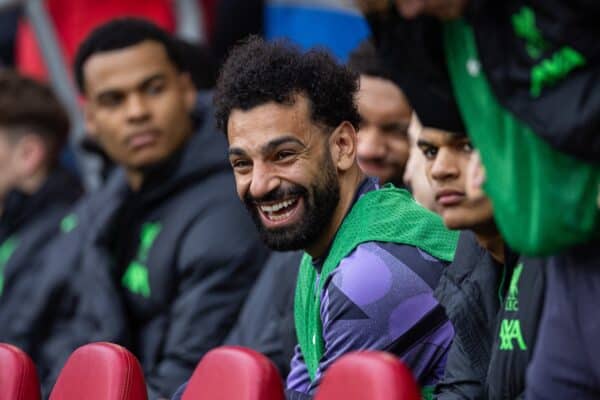

It remains to be seen how Slot approaches domestic cup competitions, but there will certainly be no room to experiment back at Europe’s top table.
Remember too, the changing format of the Champions League, which includes extra games – each side will play a minimum of eight in the initial stage, up from six – will necessitate the managing of minutes.
These are difficult conversations, particularly for a new head coach – or manager, as most will revert to calling him. Slot will have to convince two Liverpool legends accustomed to starting all Premier and Champions League games of the benefits of rotation.
The Dutchman could point to their output between August and February last season as justification, comparing it to that come the end of the campaign.
With tiring legs, both suffered a drop in form. Though Salah’s was far more pronounced. It’s a huge relief knowing he won’t be participating in this summer’s Olympics.
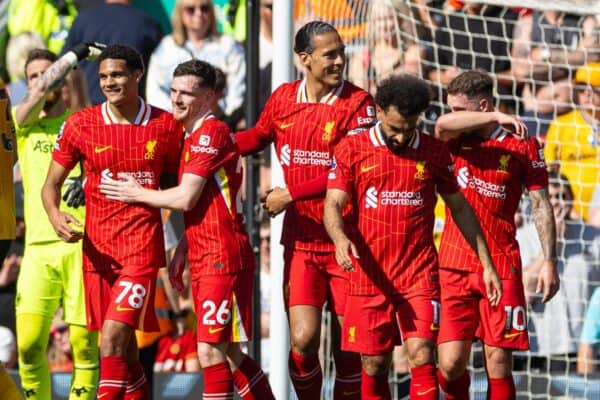

By the time matchday two of the Champions League group stage rolls around, Liverpool will face a week in which they play Wolves away (Sept 28), a European tie (Oct 1/2), and then travel to Crystal Palace (Oct 5).
While not impossible, it’s surely unrealistic to think Van Dijk could start in all three of those without impinging on fitness and/or risking injury.
Matchday three falls between games against Chelsea (H) and Arsenal (A), and matchday four is sandwiched between tricky-looking match-ups against Brighton and Aston Villa, albeit both at home.
Come the end of November, the Reds have a 10-day spell in which they’ll face a Champions League tie (Nov 26/27), followed by Man City at Anfield (Nov 30), Newcastle at St James’ Park (Dec 4) and what’s sure to be a tempestuous final derby at Goodison (Dec 7).
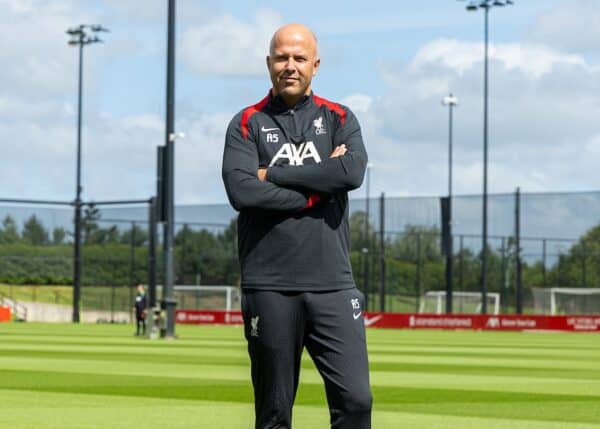

Marathon men for the best part of eight years, Liverpool will have to negotiate at least some of those fixtures without Van Dijk and Salah.
The same is true of Andy Robertson, a stalwart who has built a reputation for turning defence into attack with lung-busting runs but someone who is also now on the wrong side of 30.
The injury list will prove decisive
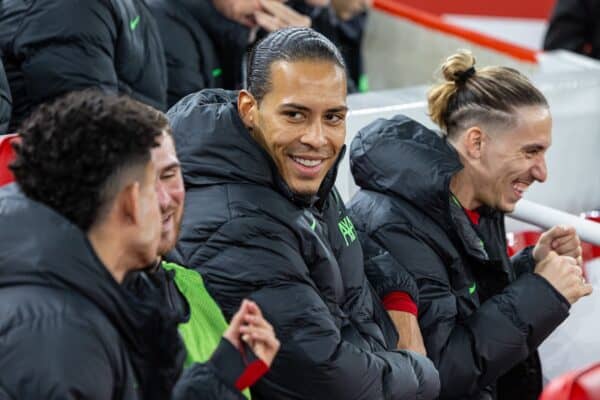

Rotation itself is dependent on several variables, not least fitness. Resting star performers is only possible when you have a relatively clean bill of health, and Liverpool’s injury record last season came with an 18 certificate.
It’s hoped the appointment of Ruben Peeters as lead physical performance coach will buck that trend.
Boasting a degree in sports science, the 32-year-old is a huge advocate of what he calls ‘periodisation’, calculating how hard and long to push individuals in training at different points of a season.
Sessions at Feyenoord would be based on morning briefings prepared by Peeters and run for the precise time he recommended, not a second more.
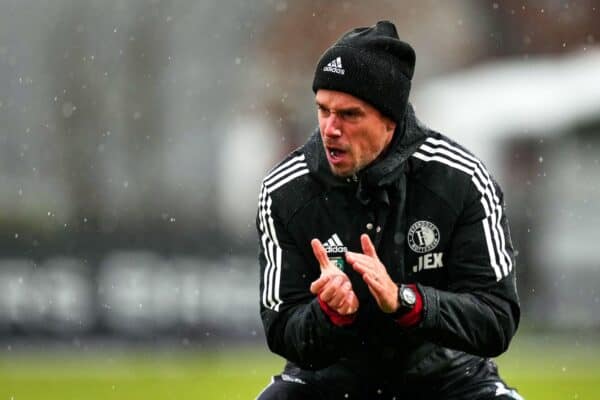

Slot puts huge trust in the Belgian and with good reason, Feyenoord’s injury record was the envy of the Eredivisie. Over the course of three seasons, player availability exceeded 90 percent.
By contrast, only Spurs had more first-teamers crocked than Liverpool last term. It’s little wonder Arne made Peeters one of the first appointments to his backroom team. He’ll prove pivotal to a new-look Liverpool still reliant on some older faces.
And so, as Van Dijk heads off on an overdue holiday licking his wounds and contemplating his future, he’ll be considering how he goes again and achieves more.
Ironically, doing less could be the answer.
[ad_2]











